|
|
|
Sort Order |
|
|
|
Items / Page
|
|
|
|
|
|
|
| Srl | Item |
| 1 |
ID:
178785
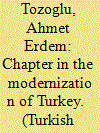

|
|
|
|
|
| Summary/Abstract |
This article examines building of the Seyhan Dam (1953–1956) in Turkey. Both Turkish and American agents played significant roles for planning and implementation of the project during the Cold War era. The 1950s provided necessary conditions in Turkey for the rise of new actors and developments to facilitate transition from limited modernity, which had mostly manifested in urban areas, to a more comprehensive state of modernity extended to rural areas. This extension had irrevocable impacts on the natural landscape as well. By referring to some patterns of modernization, this article posits building of the Seyhan Dam as a significant example to demonstrate how state-led modernization extended its scope by means of taming rivers and opening of plains for agriculture in the Cilician (Çukurova) region from late Ottoman to Republican periods.
|
|
|
|
|
|
|
|
|
|
|
|
|
|
|
|
| 2 |
ID:
178784
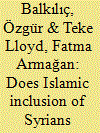

|
|
|
|
|
| Summary/Abstract |
Drawing upon the critical geopolitics literature and discourse analysis, this article will explain how the ruling AKP in Turkey fashioned an alternative, Islamically infused migration discourse in response to the Syrian refugee crisis and how it depicted this as counter-hegemonic to the dominant depictions of East and West embedded within Europe's existing securitization discourse. According to the AKP's geopolitical discourse, the differing attitudes evinced in Europe and Turkey toward the Syrian migrants can be explained by civilizational values deriving from the history and religious composition of the respective regions, as between the Orient and the Occident. However, this article examines to what extent this self-promoted discourse of Islamic inclusion has succeeded in engendering a more progressive settlement and integration regime. It argues that it has actually fostered its own system of ‘Othering’ and has led to the development of selective admission and exclusionary practices similar to those in Europe.
|
|
|
|
|
|
|
|
|
|
|
|
|
|
|
|
| 3 |
ID:
178786
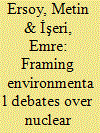

|
|
|
|
|
| Summary/Abstract |
‘The age of sustainable development’ has been characterized by an on-going debate over how to define development and which alternative energy resources to rely upon. It is high time to rethink the news media's role in this debate due to transformations in journalism, particularly the role of the media in harnessing the sustainable energy transition. Accordingly, this paper examines the role of the news media in environmental debates over Turkey's nuclear program within the country's polarized media system. Adopting a content analysis method, the paper illuminates how selected media outlets (three mainstream and one online alternative) have framed and disseminated debates over Turkey's nuclear program. The findings reveal that the media system matters in public debates on energy, but also that the alternative media have the potential to contribute to societal debates on issues – even within a polarized media setting – by voicing unspoken ideas.
|
|
|
|
|
|
|
|
|
|
|
|
|
|
|
|
| 4 |
ID:
178783
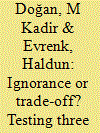

|
|
|
|
|
| Summary/Abstract |
Using data collected from an embedded survey administered to a nationally representative sample in Turkey, we test three common explanations for the re-election of corrupt politicians: Lack of Reliable Information, Efficiency Corruption Trade-Off, and Co-partisanship. We find that when voters receive reliable information that the incumbent mayor is corrupt, an electoral punishment (a decrease in the incumbent’s vote share in the coming elections) follows. This decrease, however, does not necessarily result in the incumbent being voted out, as we also find that many voters sufficiently value efficiency and co-partisanship in a corrupt politician to vote to re-elect.
|
|
|
|
|
|
|
|
|
|
|
|
|
|
|
|
| 5 |
ID:
178787
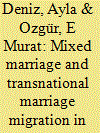

|
|
|
|
|
| Summary/Abstract |
Since the early 1990s, marriages between Russian women and Turkish men have become more common. Today, Russian brides have the top place among marriage migrants in Turkey. This study aims to reveal the actors, places, motivations and mechanisms of these marriages, which have changed the social fabric significantly. The study emphasizes the direct effects of political-economic structures on mixed marriage and marriage migrations. In this study, in-depth interviews were held with Russian brides and their Turkish husbands in İstanbul and Antalya. The results show that this 30-year-old marriage pattern has evolved substantially over time, mirroring the two countries’ political economy, and has created its own system that diverges from the global trend in several ways.
|
|
|
|
|
|
|
|
|
|
|
|
|
|
|
|
| 6 |
ID:
178788


|
|
|
|
|
| Summary/Abstract |
While much has been written to explain the mutation of Islamic-oriented parties in Turkey from pursuing an Islamic ideological cause to embracing vote-seeking behavior and democratic processes, little effort has been made to explain why the far-right establishment – represented by the Nationalist Action Party (Milliyetçi Hareket Partisi, MHP) – still resists ideological change. This article argues that fortification of nationalism with Islam in the party, the party’s identification with Turkey’s national security issues, and the construction of personality cult around party founder Alparslan Türkeş restrict its ideological moderation. Nevertheless, the party benefits from this ideological immoderation to be a key player in Turkish politics. In other words, while ideological immoderation prevents the MHP from embracing a pluralistic political stance, it has also been functional to exert its nationalist ideology on the state without sharing governmental power.
|
|
|
|
|
|
|
|
|
|
|
|
|
|
|
|
| 7 |
ID:
178789
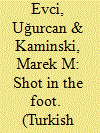

|
|
|
|
|
| Summary/Abstract |
The ruling party in Turkey, the AKP, made an ex post mistake by changing the electoral law before the parliamentary elections in 2018. The new apparentement provision allowed parties to make electoral alliances and the alliances’ total votes could then be used to meet the threshold. Surprisingly, the MHP met the threshold in the election, while one opposition party, the İP, failed to do so. AKP lost the parliamentary majority as a result. We estimate election results using four alternative scenarios, identify all parties that made ex post mistakes in supporting electoral reform, and evaluate the reform’s political consequences.
|
|
|
|
|
|
|
|
|
|
|
|
|
|
|
|
|
|
|
|
|